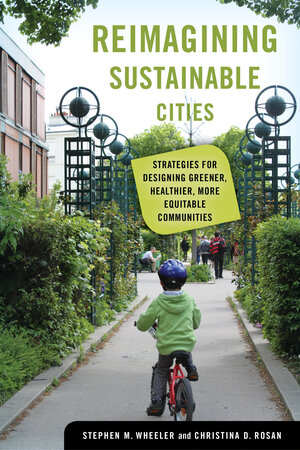By Stephen Wheeler, co-author of Reimagining Sustainable Cities: Strategies for Designing Greener, Healthier, More Equitable Communities
As one of the landmark publications of the last year in the social sciences, The Dawn of Everything: A New History of Humanity, by David Graeber and Mark Wengrow’s questions our assumptions about society and challenges us to imagine a better world.
Graeber and Wengrow destroy conventional notions of ancient human cultures making linear progress toward the modern state, capitalism, urbanism, and high levels of inequality. Instead, they survey archeological and anthropological evidence over the past 40,000 years to portray Homo sapiens as an incredibly creative species that created a profusion of social systems for itself before recent eras. Many of these cultures valued human freedom, equality, and democracy far more than present-day societies.
These authors point, for example, to evidence that Teotihuacan, which rivaled Rome in grandeur between about 100 B.C.E. and 600 C.E, was an egalitarian culture that embarked on a massive social housing program designed to give all residents decent quarters. They argue that Minoan Crete was a peaceful, female-run society, and document how Native Americans viewed European colonizers as mean, oppressed, and profoundly unfree when compared to themselves. In contrast, Graeber and Wengrow portray nation-states, global capitalism, high levels of inequality, and toxic masculinity as representing not the end of history but, if anything, an unhealthy cul-de-sac in the larger picture of social change.
Like The Dawn of Everything, our new book Reimagining Sustainable Cities strongly supports the need to reimagine our current world. When thinking about sustainable cities, many observers to date have focused on green buildings, photovoltaics, restored greenspaces, and recycling. We argue that much deeper structural change is necessary to successfully address our problems.
In Reimagining Sustainable Cities, my co-author Christina Rosan and I tackle a dozen key questions for the future, such as “How might we create more sustainable economies?,” “How might we reduce spatial inequality?,” “How might we have a more functional democracy?,” and of course “How do we get to climate neutrality?” We look worldwide for creative examples of cities and societies that have dealt with such questions. The social housing of Northern Europe, the Mexican elijido system of collective land ownership, the randomly selected “citizen’s jury” that Melbourne used for a 10-year budgeting process, and new programs for public art, form-based zoning codes, public benefit corporations, and worker cooperatives are examples of new strategies for the future.
To take one seemingly mundane example, we talk in our chapter “How Do We Manage Land More Sustainably?” about how U.S. jurisdictions such as Minneapolis and the State of Oregon have recently eliminated single-family zoning. While this may sound like a minor change, it is really quite revolutionary in the history of urban planning. Upwards of 70% of many metropolitan areas are currently zoned exclusively for single-family homes. This is a major step towards creating more diverse, equitable, and affordable housing forms, and shows that new ideas have the power to overturn a century of entrenched regulation. We also discuss other innovative land management ideas, including absentee-owner taxes such as adopted by Victoria, British Columbia, maximum limits on landownership such as adopted historically by Finland and other countries, and the efforts of land trusts and land banks in many countries to expand collective ownership of land.
I am profoundly energized by Graeber and Wengrow’s approach. They show that radically different human systems are not only possible but have been tried many times by our species. As Rebecca Solnit says in one of the epigraphs we chose for our book: “Together we are very powerful, and we have a seldom-told, seldom-remembered history of victories and transformations that can give us confidence that yes, we can change the world because we have many times before.”
